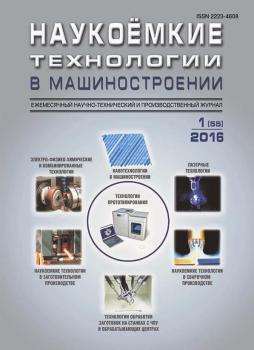National Research Nuclear University “MEPhI” (Professor)
Bauman Moscow State Technical University (Professor)
Bryansk, Bryansk, Russian Federation
Bryansk, Bryansk, Russian Federation
On based on the analysis of the possibility of hardening of steel 40x13 comprehensive treatment to a depth of 4.2 mm. the results of tests on the resistance to fracture and wear. Presents results of a study of hardness and micro geometry of the surface layer of samples. Comprehensive treatment, consisting of thermal and mechanical treatments, high-vacuum annealing and diffusion silicon may become a promising direction to increase the service life of steel parts
the combined processing, heat treatment, machining, high-vacuum annealing, diffusion siliconizing, hydrogen wear, surface quality
1. Passivity and corrosion of metals [Passivnost’ I korrozia metallov]. State Institute of applied chemistry. Under edition A.M. Sukhotina. Leningrad: Chemistry. 1971. - 208 p.
2. Suslov A.G., Shalygin M.G. Knowledge-based technol-ogy of increasing wear resistance of friction surfaces of ma-chine components operating in hydrogen environments, Nau-koemkie tekhnologii v mashinostroenii - Science intensive technologies in mechanical engineering, 2017. no. 2. pp. 19-24.
3. Shalygin M.G. Structure formation in the surface layer of machine parts by methods of high-vacuum annealing and ion implantation, Naukoemkie tekhnologii v mashinostroenii - Science intensive technologies in mechanical engineering. 2016. no. 7. pp. 10-13.
4. Orlov P.I. Basic construction [Osnovy konstruirova-niya]. Under edition P.N. Uchaeva. Moscow: Mashinostroenie.
5. Shestopalov V.E., Kvachev V.P., Dalisov V.B. and oth-ers. Increase of durability of details of molds by saturation with silicon of the polymer-containing substances. In book Generation and application of protective coatings. Leningrad: Science. 1987. pp. 194-197.
6. Shalygin M.G. Knowledge-intensive technology reduc-tion of hydrogen wear of working surfaces of friction, Nau-koemkie tekhnologii v mashinostroenii - Science intensive technologies in mechanical engineering. 2016. no. 10. pp. 3-6.
7. 560 p.





















